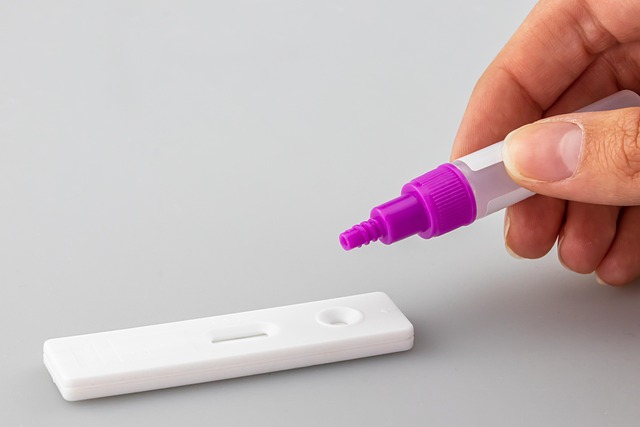Comprehensive thyroid testing reveals normal ranges for TSH (0.4-4.0 mIU/L), T4, and T3. Deviation indicates potential disorders like hypothyroidism or hyperthyroidism. Follow-up care guided by healthcare providers includes medication, lifestyle changes, and supplements based on individual needs. Lifestyle adjustments, such as diet and exercise, are crucial for managing thyroid health. Prompt medical advice is needed for abnormal results or persistent symptoms like fatigue, weight changes, and cardiovascular issues.
After undergoing comprehensive thyroid testing, proper follow-up is crucial for managing your health effectively. This article provides a detailed guide on best practices, covering key aspects from interpreting test results accurately to lifestyle changes based on findings. We explore normal thyroid function ranges, the timing and types of follow-up tests, and when to seek additional medical advice. By following these recommendations, you can ensure optimal care and well-being in relation to your thyroid health.
- Interpret Your Test Results Accurately
- Understand Normal Thyroid Function Range
- Identify Follow-Up Tests and Timing
- Lifestyle Changes Based on Results
- When to Seek Additional Medical Advice
Interpret Your Test Results Accurately

Understanding your comprehensive thyroid testing results is crucial for effective follow-up care. Accurate interpretation ensures that healthcare professionals can make informed decisions regarding treatment and management strategies. Thyroid tests, like any medical assessment, provide valuable data points that require careful analysis. This process involves comparing your test results against established normal ranges to identify any deviations that may indicate thyroid disorders such as hypothyroidism or hyperthyroidism.
When interpreting these results, consider the context of your symptoms and overall health. A positive or negative result from a thyroid test at home should be discussed with a healthcare provider who can guide you through follow-up actions. This might include further testing, adjusting medication dosages (if applicable), or exploring lifestyle changes to optimize thyroid function. Remember, proper interpretation enhances the accuracy of your diagnosis and treatment plan, leading to better management of your thyroid health.
Understand Normal Thyroid Function Range

Understanding the normal range of thyroid function is a crucial step after undergoing comprehensive thyroid testing. This knowledge allows individuals to interpret their results accurately and take appropriate actions based on their unique circumstances. The thyroid gland plays a pivotal role in regulating metabolism, influencing growth, development, and energy production throughout the body.
The healthy range for thyroid-stimulating hormone (TSH) typically falls between 0.4 to 4.0 mIU/L (mills per liter). TSH levels outside this range may indicate potential issues. For instance, elevated TSH can suggest hypothyroidism, often characterized by symptoms like fatigue, weight gain, and depression, while low TSH levels might point towards hyperthyroidism, which has signs such as increased energy, rapid heartbeat, and anxiety. Additionally, a comprehensive thyroid panel may include tests for thyroxine (T4) and triiodothyronine (T3) to further assess overall thyroid function and identify any imbalances linked to conditions like an overactive thyroid or hormonal fluctuations affecting testosterone levels at home.
Identify Follow-Up Tests and Timing

After undergoing comprehensive thyroid testing, identifying which follow-up tests are necessary and when to schedule them is crucial for maintaining optimal thyroid health. The timing of follow-ups can vary based on the initial test results and individual factors. For example, if the initial tests reveal abnormal thyroid function, further investigations may include repeat hormone levels measurements or specialized tests like thyroid ultrasound.
For athletes, thyroid testing during training periods can help ensure performance isn’t hindered by thyroid imbalances. Similarly, pregnant individuals require meticulous thyroid monitoring to safeguard both mother and child’s health. In all cases, healthcare providers should guide patients on the best supplements for thyroid health and offer personalized advice tailored to their unique needs and test results.
Lifestyle Changes Based on Results

After receiving your comprehensive thyroid testing results, lifestyle adjustments can play a significant role in managing your thyroid health. The specific changes will depend on whether your test results indicate an overactive (hyperthyroidism) or underactive (hypothyroidism) thyroid. For instance, if hyperthyroidism is detected through tests like ultrasound vs. biopsy for thyroid, dietary modifications such as reducing iodine intake and incorporating anti-inflammatory foods may be recommended. On the other hand, if hypothyroidism is identified, increasing iodine consumption and ensuring a balanced diet rich in nutrients can support thyroid function.
Additionally, regular exercise and stress management techniques are essential components of a healthy lifestyle for thyroid conditions. These practices help regulate hormone production and overall well-being. While reasons for conducting comprehensive thyroid testing include identifying potential issues early on, understanding the results and making corresponding adjustments can empower individuals to actively manage their thyroid health, especially when coupled with the occasional testosterone test at home for further insights.
When to Seek Additional Medical Advice

If your comprehensive thyroid testing reveals abnormal results or if symptoms persist despite initial treatment, it’s crucial to seek additional medical advice. A high TSH level, for instance, could indicate hypothyroidism and requires further investigation. Thyroid blood tests are essential tools to monitor your thyroid function and identify potential issues.
Thyroid fatigue causes can vary, from an underactive thyroid (hypothyroidism) to an overactive one (hyperthyroidism). If you’re experiencing symptoms like extreme fatigue, weight changes, or cardiovascular problems alongside elevated TSH levels, prompt medical intervention is advised. Your healthcare provider may recommend additional tests or refer you to a specialist for personalized care and management of your thyroid condition.
After undergoing comprehensive thyroid testing, accurate interpretation of results is key. Understanding normal thyroid function ranges and knowing when to follow up with further tests are essential practices for maintaining optimal health. Making informed lifestyle changes based on your test outcomes can significantly impact your well-being. Remember, timely medical advice is crucial, especially if symptoms persist or worsen. By adhering to these best practices, you empower yourself to actively manage your thyroid health effectively.
